Number 750 - Bing Crosby
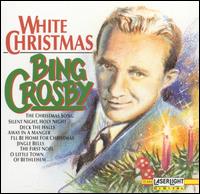
Number 750
Bing Crosby
"White Christmas"
(1956) (Re-issue)
.
.
Genre:Crooner Bing Crosby ruled the airwaves for the first half of the 20th century while Elvis owned the other half. Sounds like a fair divorce settlement to me. (Bing even got to outlive Elvis by a year too)
Bing Crosby ruled the airwaves for the first half of the 20th century while Elvis owned the other half. Sounds like a fair divorce settlement to me. (Bing even got to outlive Elvis by a year too)3.05.03 to 14.10.77
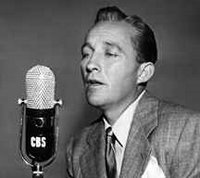 "Bing Crosby was, without doubt, the most popular and influential media star of the first half of the 20th century. The undisputed best-selling artist until well into the rock era (with over half a billion records in circulation), the most popular radio star of all time, and the biggest box-office draw of the 1940s, Crosby dominated the entertainment world from the Depression until the mid-'50s, and proved just as influential as he was popular. Unlike the many vocal artists before him, Crosby grew up with radio, and his intimate bedside manner was a style perfectly suited to emphasize the strengths of a medium transmitted directly into the home. He was also helped by the emerging microphone technology: scientists had perfected the electrically amplified recording process scant months before Crosby debuted on record, and in contrast to earlier vocalists, who were forced to strain their voices into the upper register to make an impression on mechanically recorded tracks, Crosby's warm, manly baritone crooned contentedly without a thought of excess."
"Bing Crosby was, without doubt, the most popular and influential media star of the first half of the 20th century. The undisputed best-selling artist until well into the rock era (with over half a billion records in circulation), the most popular radio star of all time, and the biggest box-office draw of the 1940s, Crosby dominated the entertainment world from the Depression until the mid-'50s, and proved just as influential as he was popular. Unlike the many vocal artists before him, Crosby grew up with radio, and his intimate bedside manner was a style perfectly suited to emphasize the strengths of a medium transmitted directly into the home. He was also helped by the emerging microphone technology: scientists had perfected the electrically amplified recording process scant months before Crosby debuted on record, and in contrast to earlier vocalists, who were forced to strain their voices into the upper register to make an impression on mechanically recorded tracks, Crosby's warm, manly baritone crooned contentedly without a thought of excess."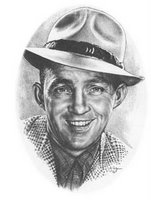 "Not to be forgotten in charting Bing Crosby's influence is the music itself. His song knowledge and sense of laid-back swing was learned from early jazz music, far less formal than the European-influenced classical and popular music used for inspiration by the vocalists of the 1910s and '20s. Jazz was by no means his main concentration, though, especially after the 1930s; Crosby instead blended contemporary pop hits with the best songs from a wide range of material (occasionally recording theme-oriented songs written by non-specialists as well, such as Cole Porter's notoriously un-Western "Don't Fence Me In"). His wide repertoire covered show tunes, film music, country & western songs, patriotic standards, religious hymns, holiday favorites, and ethnic ballads (most notably Irish and Hawaiian). The breadth of material wasn't threatening to audiences because Crosby put his own indelible stamp on each song he recorded, appealing to many different audiences while still not endangering his own fan base. Bing Crosby was among the first to actually read songs, making them his own by interpreting the lyrics and emphasizing words or phrases to emphasize what he thought best. "
"Not to be forgotten in charting Bing Crosby's influence is the music itself. His song knowledge and sense of laid-back swing was learned from early jazz music, far less formal than the European-influenced classical and popular music used for inspiration by the vocalists of the 1910s and '20s. Jazz was by no means his main concentration, though, especially after the 1930s; Crosby instead blended contemporary pop hits with the best songs from a wide range of material (occasionally recording theme-oriented songs written by non-specialists as well, such as Cole Porter's notoriously un-Western "Don't Fence Me In"). His wide repertoire covered show tunes, film music, country & western songs, patriotic standards, religious hymns, holiday favorites, and ethnic ballads (most notably Irish and Hawaiian). The breadth of material wasn't threatening to audiences because Crosby put his own indelible stamp on each song he recorded, appealing to many different audiences while still not endangering his own fan base. Bing Crosby was among the first to actually read songs, making them his own by interpreting the lyrics and emphasizing words or phrases to emphasize what he thought best. "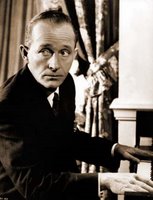 "His influence and importance in terms of vocal ability and knowledge of American popular music are immense, but what made Bing Crosby more than anything else was his persona -- whether it was an artificial creation or something utterly natural to his own personality. Crosby represented the American everyman -- strong and stern to a point yet easygoing and affable, tolerant of other viewpoints but quick to defend God and the American way -- during the hard times of the Depression and World War II, when Americans most needed a symbol of what their country was all about. "
"His influence and importance in terms of vocal ability and knowledge of American popular music are immense, but what made Bing Crosby more than anything else was his persona -- whether it was an artificial creation or something utterly natural to his own personality. Crosby represented the American everyman -- strong and stern to a point yet easygoing and affable, tolerant of other viewpoints but quick to defend God and the American way -- during the hard times of the Depression and World War II, when Americans most needed a symbol of what their country was all about. "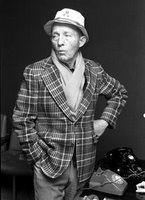 "As with all the jazz-oriented stars of the first half of the 20th century, Crosby's chart popularity was obviously affected by the rise of rock & roll in the mid-'50s. Though 1948's "Now Is the Hour" proved his last number one hit, the lack of chart success proved to be a boon: Crosby now had the time to concentrate on album-oriented projects and collaborations with other vocalists and name bands, definitely a more enjoyable venture than singing pop hits of the day on his radio show, ad nauseam. Inspired by the '50s adult-oriented album concepts of Frank Sinatra (who had no doubt been inspired by Bing in no small way), Crosby began to record his most well-received records in ages, as Bing Sings Whilst Bregman Swings (1956) and Bing With a Beat (1957) returned him to the hot jazz he had loved and performed back in the 1930s. His recording and film schedule began to slow in the 1960s, though he recorded several LPs for United Artists during the mid-'70s (one with Fred Astaire) and returned to active performance during 1976-1977. While golfing in Spain on October 14, 1977, Bing Crosby collapsed and died of a heart attack". ~ John Bush
"As with all the jazz-oriented stars of the first half of the 20th century, Crosby's chart popularity was obviously affected by the rise of rock & roll in the mid-'50s. Though 1948's "Now Is the Hour" proved his last number one hit, the lack of chart success proved to be a boon: Crosby now had the time to concentrate on album-oriented projects and collaborations with other vocalists and name bands, definitely a more enjoyable venture than singing pop hits of the day on his radio show, ad nauseam. Inspired by the '50s adult-oriented album concepts of Frank Sinatra (who had no doubt been inspired by Bing in no small way), Crosby began to record his most well-received records in ages, as Bing Sings Whilst Bregman Swings (1956) and Bing With a Beat (1957) returned him to the hot jazz he had loved and performed back in the 1930s. His recording and film schedule began to slow in the 1960s, though he recorded several LPs for United Artists during the mid-'70s (one with Fred Astaire) and returned to active performance during 1976-1977. While golfing in Spain on October 14, 1977, Bing Crosby collapsed and died of a heart attack". ~ John BushFor Elvis Presley see Number 876
For Frank Sinatra see Number 933
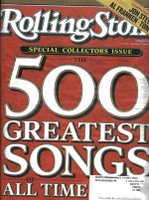 What do Rolling Stone think about Bing Crosby?..
What do Rolling Stone think about Bing Crosby?.."On this day in 1942, Bing Crosby records the holiday classic "White Christmas." It became the biggest selling single of all time until Elton John's "Candle in the Wind" dethroned it in 1998."
Believe it or not, thats all i could find.
Rolling Stone Top 500 Songs ranked this song at Number (We believe Bing does not represent the community of Rock n Roll) and the Album ranked at Number (Before our time)
This song has a crowbarred rating of 66.4 out of 108
Bing Crosby - White Christmas
Uploaded by beautifulcynic - Music videos, artist interviews, concerts and more.
Tags: Bing Cosby,
Bing Cosby,  1956,
1956,  Crooner,
Crooner,  Elvis Presley,
Elvis Presley,  Cole Porter,
Cole Porter,  Frank Sinatra,
Frank Sinatra,  Fred Astaire,
Fred Astaire,  Music,
Music,  YouTube,
YouTube,  Music Video,
Music Video,  Rolling Stone Magazine,
Rolling Stone Magazine,  Crowbarred,
Crowbarred,  New Zealand,
New Zealand,  The Definitive 1000 Songs Of All Time
The Definitive 1000 Songs Of All Time
Search by Genre: ALT POP-ALT PUNK-ALT ROCK-ALTERNATIVE-BIZARRE-BLUES-BRIT POP-COMEDY-COUNTRY-CROONER-DANCE-DISCO-DO WOP-ELECTRONIA-FOLK SINGER-FOLK ROCK-FUNK-GARAGE ROCK-GLAM ROCK-GOSPEL-GRUNGE-GUITARIST-HAIR ROCK-HARD ROCK-HIP HOP-INDIE POP-INDIE ROCK-INDUSTRIAL ROCK- INSTRUMENTAL-JAZZ-LAZY SUNDAY-NEW WAVE-NU ROCK-POP-POP ROCK-PROG ROCK-PSYCHEDELIC ROCK-PUNK POP-PUNK ROCK-R&B-RAP-REGGAE-ROCK-ROCK N ROLL-SINGER SONGWRITER-SKA ROCK-SKIFFLE-SOFT ROCK-SOUL-SOUTHERN ROCK-SURF ROCK-SYNTH POP-TENOR-VOCAL
By The Year 1955 to 2005:
1955, 1956, 1957, 1958, 1959, 1960, 1961, 1962, 1963, 1964, 1965, 1966, 1967, 1968, 1969, 1970, 1971, 1972, 1973, 1974, 1975, 1976, 1977, 1978, 1979, 1980, 1981, 1982, 1983, 1984, 1985, 1986, 1987, 1988, 1989, 1990, 1991, 1992, 1993, 1994, 1995, 1996, 1997, 1998, 1999, 2000, 2001, 2002, 2003, 2004, 2005

underlay trademe
Kapiti
Labels: Bing Crosby












0 Comments:
Post a Comment
<< Home